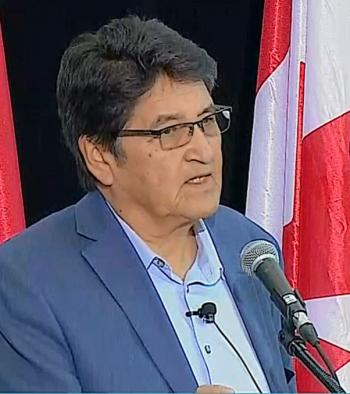Image Caption
Summary
By Deb Steel
Windspeaker.com Writer
Former national chief of the Assembly of First Nations, Ovide Mercredi, schooled the participants of this morning’s session at the Nation-to-Nation National Summit in the history of the treaties, the failure of Canada to implement them with honor, and the consequences of that failure.
“We can’t trust this country, and you can’t persuade me otherwise until I see evidence why I should trust this county.”
Mercredi took part in a panel discussion chaired by former prime minister Joe Clark. The focus of Mercredi’s presentation was lessons learned, and what is required for a renewed relationship between Indigenous Nations and Canada.
He opened the presentation with a lesson learned from his own childhood when he was given a task.
“We were always reminded to finish what we started.”
He said it’s a lesson Canada needs to learn, and it’s a lesson that Prime Minister Justin Trudeau, in particular, needs to learn.
“Finish what your father started”, Mercredi said, calling for the legal power to ensure that Indigenous rights are recognized and implemented.
“It will not be enough for a policy on treaty implementation. It will not be enough to have a policy on self-government as a basis for our foundation with the country.”
He said, knowing what he knows of the Canadian population and the federal system, “in the absence of a Constitutional mandate Canadians will forget. Their politicians will forget and we will be left behind again and we will repeat the mistakes of the last 150 years.”
He pointed to the promise contained in “the new Canada act” (Canada’s Constitution, 1982) —Section 37, which Mercredi explained authorizes the Prime Minister to convene a meeting of all the premiers and Aboriginal leaders for the explicit purpose of identifying and defining Indigenous rights to be included in the Constitution.
Mercredi said the Charlottetown Accord recognized the inherent right of the Indigenous people to their own government, to define their own destiny in this country and to do it in a manner consistent with their own understanding of what that destiny represented for them.
That provision was the idea of creating institutions as nations to discard the colonial experience, to go beyond the Indian Act and Indian Act controlled communities, he said.
“I’ve always been bewildered, I would say, by the assumption of power that Canada took upon itself to be the ruler of my people,” Mercredi had told his audience earlier in his presentation.
He said Indigenous people neither gave consent nor were they asked to participate as Canada formulated the Indian Act.
He said Canada also needs to finish what its predecessors started with pre-Confederation treaties, which he said deal with the idea of relationships and peaceful co-existence “where our people made a commitment not to engage in violence against the settlers.”
These treaties also reminded the settler that Indigenous peoples were the masters of their territories. “And that the land was not empty” and that the land had government, and people in it, and had relationships with other Indigenous peoples for trade and commerce pre-dating any white settler.
These treaties still exist, said Mercredi, and they still frame the identity of Canada, “an identity that Canada failed to adopt when Confederation occurred.”
Canada learned nothing from the pre-Confederation treaties, Mercredi said, when it struck treaties 1 through 11. And when Canada thought it had accomplished their mission in terms of British Columbia becoming part of the Confederation, he said it forgot that the promise to make treaties had not been fulfilled. B.C. was ignored, as were other parts of the country.
“So, finish what you started, Canada.”
Mercredi talked about the ideas of integrity, honor and good faith, and the absence of integrity, honesty, honor and good faith in implementing treaties.
“It is so important in relationships that when people make bargains or agreements to implement those agreements in a manner that is acceptable to both parties.
“What happened here is not that.”
“Trust is not easy to give,” Mercredi said, “and it will not come because of words.” It will only come if concrete action is taken to honor treaties in the way that Indigenous peoples understood them, he said.
If they had been in the past, Indigenous people would be the richest people in the country, not the poorest.
“Clearly, the lessons learned on our part, as Indigenous people, is that we can’t trust this country.”

